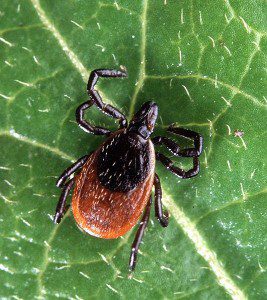Lyme Disease and You-
Summertime is just around the corner and you will be spending more time outdoors. One of the common problem that arises (besides mosquitoes) are the increase in ticks. And, with ticks can come Lyme Disease. There are only 2 types of ticks that transmit Lyme Disease; Deer Ticks and the Western Black Legged Ticks. Not every tick will give you Lyme Disease, however it is important to know the symptoms and watch bites carefully.
How to Safely Remove a Tick-
If you notice a tick on yourself, a family member or your pet there are several steps for a safe removal of the tick.
- First, use fine tipped tweezers. The narrowness of the tips allow for precision placement of the tweezers and easiest removal.
- Second, grab the tick firmly as close to the skin as possible. If you grab too far back you may not get the entire tick out.
- Third, pull firmly, without twisting, straight backwards. Avoid squishing the tick and releasing infection into the wound area. Twisting may break tick in pieces causing further anguish and pain.
- Fourth, clean area with soap and water. Keep the area clean.
- Fifth, watch area for telltale bullseye reaction of Lyme Disease. Other symptoms may include headache, dizziness or fever. If any of these symptoms appear, call your doctor immediately for medical advice.
Information About Lyme Disease-
Lyme disease does occur in Tennessee, although not as common as other areas. It is important to know what to look for and how it is treated. The telltale bullseye occurs in about 70-90% of all cases. The first signs may be a red rash around the bite location. Other symptoms are headache, dizziness and/or fever. If you have any symptoms seek medical treatment. If you have Lyme Disease and receive treatment quickly, the reoccurrence or long term health problems will be avoided. Those who waited until they have had Lyme Disease for 3 or more weeks increase have future problems by 60%.
How to Prevent Lyme Disease-
Unless you live in a bubble, without visitors or pets, it is likely you will come in contact with a tick at one point in your lifetime. Preventing ticks bites can be difficult if you are an avid outdoorsman.
Here are some tips to help you avoid tick bites:
- When you are hiking outside, cover bare skin. Avoid shorts, sandals and tank tops.
- Wear bug spray. There are many controversial topics regarding DEET. But DEET in bug spray does significantly reduce the occurrence of tick bites.
- Tuck pant bottoms into socks and wear long sleeves, when hiking or spending long periods of time in the woods.
We hope you have a safe and wonderful summer. Please let us know if there are any pest issues you are experiencing. We will be glad to help you however we can. Call our office at 625-220-1933 or click HERE for our online contact form.
For more information about Lyme Disease, HERE is the Pest World informational website.




